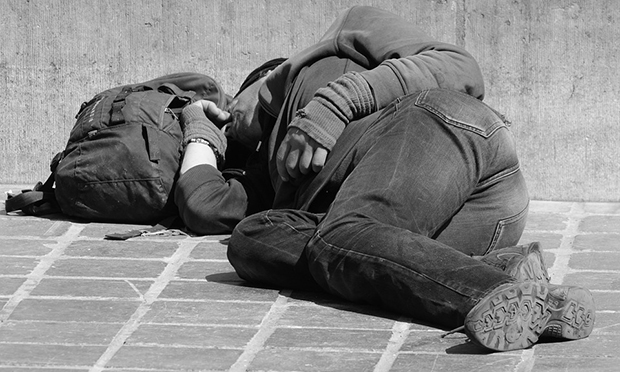Homelessness crisis worsens as Town Hall is forced to use shelters outside Hackney

Homeless in Hackney: Number of people in need of temporary accommodation rises by almost a third since April.
Hackney’s homelessness crisis has worsened significantly in recent months, straining the council’s resources and forcing it to put people up outside the borough.
The number of people requiring temporary accommodation has increased by 13 per cent since April, according to council officers.
As a result, the Town Hall is increasingly looking beyond its own borders in order to meet the demand for shelter places.
The council was responding to a damning April report from Healthwatch Hackney and Hackney & City Mind on the experience of single homeless people with mental health needs.
The report was presented at a 13 September meeting of the Living in Hackney Scrutiny Commission.
The council’s response read: “The council’s Move-On team looks to assist households into secure permanent accommodation within the private sector.
“However, affordability issues means that these properties are largely outside the overheated market in Hackney.
“Most single homeless people with low level needs are not a
priority, and local authorities like Hackney are required under law to give preference to other vulnerable groups such as households with children or those fleeing domestic violence.”
The Healthwatch/Mind report also documented delays of up to nine months in processing applications for temporary accommodation from homeless single people with mental health problems, together with a litany of communication problems.
A previously homeless man named Andrew attended the meeting and told of over 30 emails to council officers going unanswered while he was attempting to secure accommodation.
The council’s response also said the Town Hall “did not recognise” many of the report’s criticisms about communication failures.
However, it admitted that it struggled to meet targets for the timely
processing of applications, stating that “when there are a number of variables affecting both the realistic options on offer and potential timeframes, it is often impractical to make absolute commitments”.
The report also highlighted inadequacies in some hostel provision in the borough.
The council currently has over 4,300 “priority” households – defined by the Housing Act as those with vulnerable people, pregnant women, children, 16 to 20-year-olds, or those who are homeless because of an emergency.
The council has a statutory duty to provide accommodation in Hackney for priority households.
But those with lower priorities, including most single people, will generally be offered permanent housing outside the borough.
Councillors expressed dismay at the findings and the level of support provided for homeless people.
Cllr Sharon Patrick (Lab, Kings Park), chairing the commission, had recently visited St Martin’s, a council hostel with 21 rooms, and reported “very poor” conditions, citing issues with toilet facilities and fire safety.
Members of the Living in Hackney Scrutiny Commission, whose brief includes housing, quizzed council officers over the borough’s approach to homelessness.
Also in attendance at the meeting was Malcolm Alexander of Healthwatch Hackney, who noted the importance of effective communication with people while their cases are being considered.
Alexander said that “often very simple things can make a huge difference to people”, helping them “not having to think they are fighting the system”.
Reassurances were given by council officers attending the meeting that the problems were being addressed.
The council’s official response to the Healthwatch report noted that many of its criticisms had been superceded by legislation, in particular the Homelessness Reduction Act, which partially came into force in April.
Rough sleeping in London has more than doubled since 2010, and 80 per cent of homeless people in England report having mental health needs.
In Hackney, more than 12,000 households are currently on the housing waiting list and of those, 2,700 are in temporary accommodation.
Correction – this article was updated at 15:45 on Wednesday 19 September. The number of people requiring temporary accommodation in Hackney has risen by 13 per cent since April, not 29 per cent.
